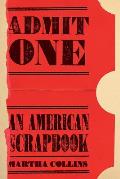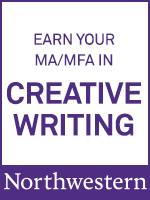April 2016
Kali Lightfoot
poetry
Admit One: An American Scrapbook by Martha Collins

Growing up in mid-twentieth-century Midwestern American white culture, one learned that there are things best left undiscussed in polite company. Race was one of the very least acceptable topics, one that can still reduce an otherwise progressive book club to stunned silence. Thankfully for all of us, Martha Collins, Iowa native, author of seven previous poetry books, co-translator of four collections of Vietnamese poetry, founder of the creative writing program at University of Massachusetts-Boston, and former professor at Oberlin College, has stepped firmly beyond the fear, collective guilt, and awkwardness that can silence a Midwestern -- and almost any other -- white American to speak boldly about the history of racism in our country.
The subtitle of Collins's new collection Admit One is An American Scrapbook. A scrapbook is a place to collect and preserve clippings, photos, and other memorabilia -- a static collection of reminders of past events and people -- but Admit One is far from static. In fact one of its great features is the way the work moves. The book is beautifully and carefully structured by a master poet and storyteller to create a relentless, fierce recounting of a less than salutary time in our collective history.
Admit One completes a trilogy that began in 2006 with Blue Front, a book-length poem about a lynching witnessed in 1909 by Collins's father -- and 10,000 other people in Cairo, Illinois -- when he was five years old. The second book, White Papers, is a collection of untitled, numbered poems that Collins has described as her attempt to educate herself about her own past and the racial history of the country. Each of the books also contains an extensive bibliography of the sources Collins read or consulted.
Admit One is structured in four sections, each built around an event or historical development in the period roughly between 1904 and 1930. In the first section, "Fair -- 1904 St. Louis World's Fair, Louisiana Purchase Exposition," the first poem, "Meet Me in St Louis," carries the epigraph:
OPEN YE GATES
SWING WIDE YE PORTALS
ENTER HEREIN YE SONS OF MAN...
then begins with the stanza:
My mother went, inside
her mother, mother and father
went in, what did they see?
This glimpse of a personal connection -- her mother attending the Fair in utero -- at the beginning of the section is a bit of genius in terms of grounding the reader in the reality of everything that will come after.
"Meet Me in St Louis" then becomes a list of some of the wonders at the fair:
20 million trees and plants
75 miles of roads and walks
14 miles of railroad track...
the most progressed the most --
O Civilization -- the most evolved
Following this stanza of the poem is a quote centered on the page and in italics, a form that appears throughout the book -- quotations that are in italics but unattributed to a source:
Don't tell me the lights are shining
Any place but there!
Collins then returns to the list, ending "Schools for Defectives: blind made brooms," and the poem ends with a bit of word study in two stanzas that riff on the usage and meaning of the word "make" either alone or within phrases. This is again centered on the page with ample interior white space around the words:
make
bring into being by
work trouble money
progress tracks time
for something out
of something
In this first poem, Collins introduces us to some of the elements of style found throughout the book: lists, word studies, brief personal narratives, quotes from other sources, newspaper pages, timelines, and lyric riffs. The choices that Collins made throughout the book to write in so many different forms of her own devising give the collection pacing that makes it more interesting, readable, and memorable than a homogenous rendering might have been. There is a diversity in the poems that gives the book strength. Its combination of lyricism, history, and ethics fairly dances across the pages.
As the poems stride deeper into the Fair, Collins focuses the reader's attention beyond the wonders of the Fair to the fact that thousands of "primitive" people were "acquired" from across the globe and brought to the Fair to be displayed. Among them was Ota Benga, an African "Pygmy." His story is told beginning in Fair and continuing in "Zoo, 1906," the second section of the book, where he becomes a display in the Primate House of the Bronx Zoo, later is moved to other venues several times, and ultimately dies by his own hand on a farm in Virginia.
In the Zoo section we also meet Madison Grant, hunter friend of Theodore Roosevelt, author of The Passing of the Great Race: Or the Racial Basis of European History, and founder of the Bronx Zoo. He becomes a focus of the third section, "Fitter, 1916." From "Madison Grant, Part Two":
But there were three within the white
Nordic Alpine Mediterranean
Not a new idea (see Ripley, 1899) but Grant
popularized Nordic (the term) andadded race to Eugenics (a word
invented by Darwin's cousin Galton)
which was already leading to segregation
and sterilization of the unfit
It is in the Fitter section that the depth and breadth of the research Collins has done begins to make the work in Admit One seem relentless. Quotations from Madison Grant, a visual poem structured as a front page of the "Du Quoin Evening Call, 1916" (the Illinois newspaper owned by Collins's grandfather), word study poems "race/race" and "fit/fit," and anti-miscegenation themes all combine into the kind of appalling history that many if not most white people would like to walk away from.
"Alien, Part One," a poem in section three about immigration and exclusion, foreshadows the final section titled "Fewer, 1924," including the poem "Madison Grant, Part Three," in which the book begins to connect all that has gone before with the events that led up to the Holocaust in Germany:
After The Passing of the Great Race
which was published in Germany in 1925, Adolf Hitler
(who owned a copy) wrote (according to another eugenicist)
a letter to Madison Grant that said: The book is my bible.
The title, "Fewer," in section four brings together a probably inevitable progression from the eugenics of race to concepts of racial integrity through sterilization of defectives and activities of the Ku Klux Klan, to exclusionary immigration laws; coming full circle from the "Admit One" of tickets to the Worlds Fair to "Admit One" of immigration. From "Du Quoin Evening Call, 1924":
[The speaker] commended the
new immigration measure
which cuts down the number of
aliens . . . admitted yearly, and
explained why it was necessary to
stem the tide of immigration if this
nation is to survive.
Although the body of Admit One ends in the 1920s, the five poems contained in the "Postscript" bring the work up to 2014, making clear that the book is a catalog of a history that America has not grown beyond. The final postscript poem, "Exit/Exeunt" ends with this final stanza and caution to us all:
closed no or into the open
air the way out will
not be the way. we came
By beginning each section with a narrative poem about a family event related to the topic of the section, Collins grounds the work in reality. There is power in the combination of meticulous research and personal familial history that makes the truth of the stories very hard to dismiss. Also, the work's focus on specific people -- Ota Benga, Carrie Buck, Madison Grant, and others -- as well as on broader societal movements, brings each section home to roost for the reader. And roost it does. It is hard to listen to the frightening rhetoric that has been part of the 2016 presidential campaign without noticing echoes of the Fitter and Fewer sections of the book. Admit One and the earlier books in the trilogy make a disturbing and essential read.
"The way out will not be the way we came."
Admit One: An American Scrapbook by Martha Collins
University of Pittsburgh Press
ISBN: 978-0822964056
89 pages




